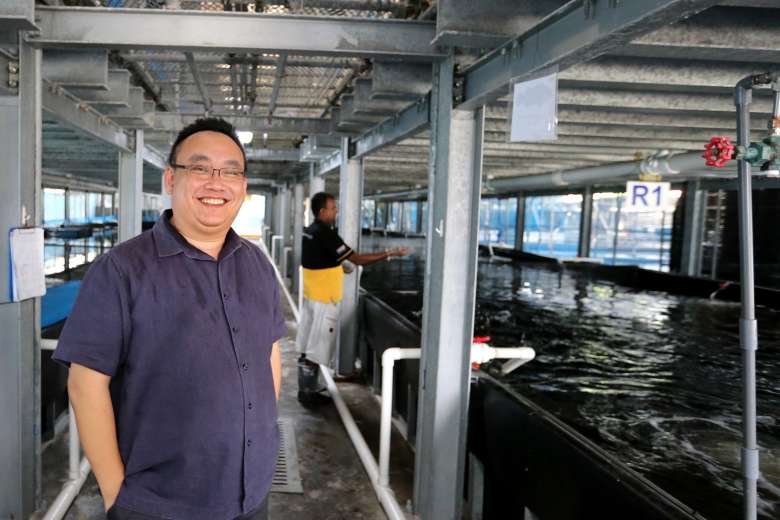 Mr Ng, group CEO of Apollo Aquaculture, at his company's farm in Lim Chu Kang, one of 62 that will see their leases expire in 2019.ST PHOTO: JONATHAN CHOO
Mr Ng, group CEO of Apollo Aquaculture, at his company's farm in Lim Chu Kang, one of 62 that will see their leases expire in 2019.ST PHOTO: JONATHAN CHOO
In a boost for Singapore's food security, local company Apollo Aquaculture Group will be setting up a high-tech farm in Brunei in a joint venture.
Mr Eric Ng, 44, group chief executive officer of Apollo Aquaculture Group, said the vertical fish-farming system will be remotely controlled and monitored from Apollo Aqua- culture's farm in Singapore.
With underwater sensors to measure parameters like temperature and salinity, the need for manpower is reduced and workers can respond to emergencies quickly, he said.
Noting that the yearly output of fish is eventually expected to reach 5,000 tonnes per year, Mr Ng said the farm will produce fish for consumption, such as groupers, as well as ornamental fish.
The joint venture between Apollo Aquaculture and a Bruneian partner - KR Apollo - was announced yesterday at a groundbreaking ceremony at the new farm in Brunei.
Minister of State for National Development and Trade and Industry Koh Poh Koon and Bruneian Minister of Primary Resources and Tourism Ali Apong attended the event.
In his speech, Dr Koh said Singapore is always looking to strengthen its food security by importing from a variety of sources.
He said: "Now, we have a vibrant farming sector, but as you can all understand, there are very obvious space constraints in Singapore.
"Brunei, on the other hand, is looking to diversify its economy, and agriculture is a potentially lucrative sector. One can see the potential for collaboration and sharing of know-how."
Mr Ng's decision to venture into Brunei was partly because his farm is one of 62 in Lim Chu Kang that will see their leases expire in 2019.
"Land is very scarce here. Brunei is different - they have abundant land and resources," said Mr Ng.
"By setting up a farm in Brunei, it also ensures that we have a backup in case anything happens to our farm here," he added.
Professor Paul Teng, adjunct senior fellow in food security in the Centre for Non-Traditional Security Studies at the S. Rajaratnam School of International Studies, said any additional imported food source would increase Singapore's resilience.
However, he added that the cost effectiveness of importing seafood from Brunei remains to be seen.
"It would probably still cost less to import seafood from Peninsular Malaysia and Indonesia," he added.
Last year, Singapore imported fresh and frozen fish from about 80 countries, including Indonesia, Vietnam, Malaysia, Denmark and Senegal. There were no Brunei imports.
Past imports of fish from Brunei were minimal, said the Agri-Food and Veterinary Authority.
Local fish farmers produced 4,900 tonnes of fish last year, accounting for about 10 per cent of fresh (live and chilled) fish eaten here.
Mr Ng hopes the joint venture will be a positive example for local farms to follow.
He said: "The traditional method for fish farming has never changed. It's very tough work. But with technology, the possibilites are endless."